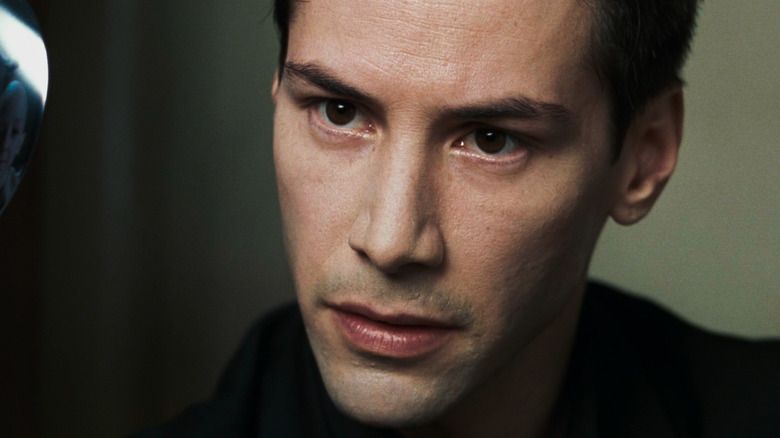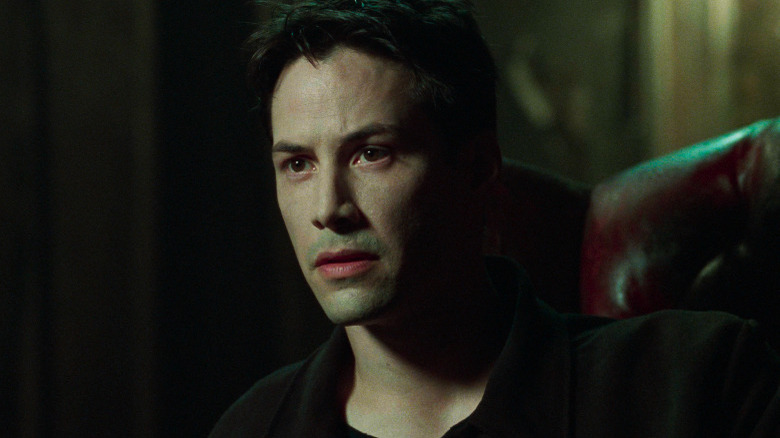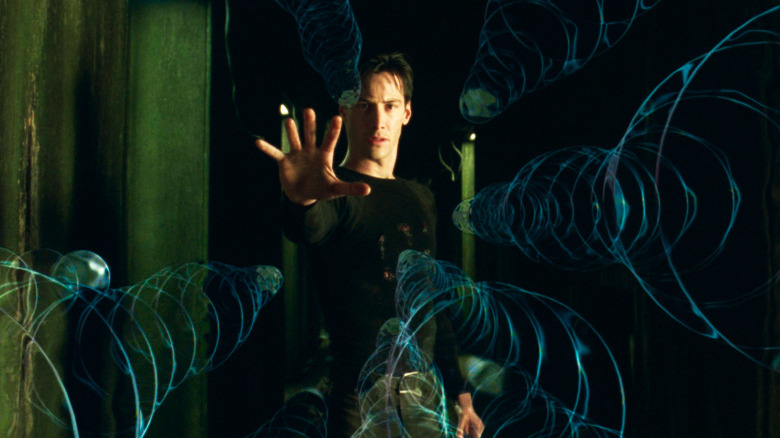Keanu Reeves Was The Right Kind Of 'Maniac' For The Matrix's Leading Role
Forget Daniel Day-Lewis, Sean Penn, and Jared Leto. You know who really goes hard for their film roles? Keanu Reeves.
Actors of the "Method" variety (like those listed above) have earned a fairly poor reputation of late for being intolerable or even inappropriate in the way they conduct themselves on set. Reeves is known for committing to his roles with the same intensity as any Method actor but hasn't received any blowback for it. That he also stars in some of the most violent action movies in recent memory only makes his reputation for being a giant cinnamon roll in real life all the more endearing.
One need look no further than Reeves' prep work for the "John Wick" movies for proof. The actor is famous for undergoing hours of heavy training to perform as many of the films' "gun-fu" fights and action scenes on his own as possible. He even learned how to do stunts while riding a horse for a one-off scene in "John Wick: Chapter 3 — Parabellum," in which his character escapes from a pack of assassins by stealing a horse from a stable and riding it into downtown Manhattan (he then proceeds to beat the fudge out of some hired killers on motorbikes).
Years (nay, decades) before that, Reeves similarly put both his mind and body through a rigorous training regimen in order to play Neo in "The Matrix," back when few actors seemed to realize just how revolutionary the sister-director duo Lana and Lilly Wachowski's sci-fi movie would be. It was that commitment that made the filmmakers realize they had found the "maniac" they needed to realize their vision.
The search for the One
A 2019 article in Wired to mark "The Matrix" turning 20 revealed the long list of actors who passed on playing Neo. Their ranks include Will Smith, who, by his own admission, found Lana and Lilly Wachowski's pitch for the film confusing (especially when they tried to describe how the freeze-frame jump scene would look). Brad Pitt and Leonardo DiCaprio also said no to the role, with the latter citing a desire to take a break from visual effects-heavy movies right after working on "Titanic." He would go on to star in Danny Boyle's "The Beach" instead.
Finally, after failing to land Sandra Bullock by offering to gender-swap Neo, the Wachowskis sent Keanu Reeves their script in the hopes of luring him aboard. Reeves was coming off starring in Taylor Hackford's 1997 thriller "The Devil's Advocate" (a financial hit that critics were initially mixed on), but knew right away he wanted to take the red pill, telling Wired, "When I first read that script, it made my blood happy." He added, "[The Wachowskis] told me they wanted [me] to train for four months prior to filming. And I got a big grin on my face and said, 'Yes.'"
It's well known by now that the Wachowskis don't do things in half-measures. When they're not pushing the very limits of visual storytelling with projects like "The Matrix" and "Speed Racer," they're creating elaborate narrative mosaics that highlight universal aspects of the human experience across historical, geographical, and cultural lines in "Cloud Atlas" and "Sense8." At the time, of course, Reeves had only the faintest inkling of what he was getting himself into, but Lana Wachowski was confident he was the One for them, saying, "We knew it would take a maniacal commitment from someone, and Keanu was our maniac."
Keanu the wise
Another thing that's changed dramatically since the late 1990s is the public's perception of Keanu Reeves. It's easy to forget in the post-"John Wick" era, but dismissing Reeves' physical, internal acting style as "wooden" was once a popular pastime among anonymous denizens of the Internet. If they weren't joking that he was secretly playing himself in the "Bill & Ted" films, people online were slamming his line delivery in films like "Point Break" or bringing up "Bram Stoker's Dracula" (where he was miscast as Jonathan Harker, plain and simple) as "proof" that he's a bad actor.
In reality, Reeves' ability to be just as convincing portraying Ted Logan, Neo, and John Wick as he is playing the sensitive Scott Favor in Gus Van Sant's "My Own Private Idaho," or the skeevy-as-hell Hank in Nicolas Winding Refn's "The Neon Demon" is a testament to his craft as an actor. His prep work for his roles goes beyond physical training, too, like when he gladly read Jean Baudrillard's 1981 philosophical treatise "Simulacra and Simulation" at the request of Lana and Lilly Wachowski ahead of production on "The Matrix" (via BBC).
To quote Lorenzo di Bonaventura, who was the president of production at Warner Bros. when the Wachowskis were developing "The Matrix:"
"One of the great misunderstandings about Keanu is that people don't think he's smart. Maybe it's because of the 'Bill & Ted' movies. But Keanu gives me books I cannot make heads nor tails of. And in Keanu, the Wachowskis found somebody who was an intellectual searcher."
Whether it involves sharpening his martial arts skills, picking up a new trick, or diving into mind-bending works of philosophy, let it never be said Reeves can't go toe-to-toe with any Method actor when it comes to his work ethic.


